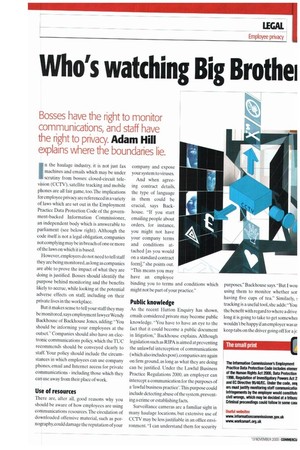Who's watching Big Brothel
Page 35

If you've noticed an error in this article please click here to report it so we can fix it.
Bosses have the right to monitor communications, and staff have
the right to privacy. Adam Hill
explains where the boundaries lie.
In the haulage industry, it is not just fax machines and emails which may be under scrutiny from bosses: closed-circuit television (CCTV), satellite tracking and mobile phones are all fair game, too. The implications for employee privacy are referenced in a variety of laws which are set out in the Employment Practice Data Protection Code of the government-backed Information Commissioner, an independent body which is answerable to parliament (see below right). Although the code itself is not a legal obligation, companies not complying may be in breach of one or more of the laws on which it is based.
However, employers do not need to tell staff they are being moni tored. as long as companies are able to prove the impact of what they are doing is justified. Bosses should identify the purpose behind monitoring and the benefits likely to accrue, while looking at the potential adverse effects on staff, including on their private lives in the workplace.
But it makes sense to tell your staff they may be monitored, says employment lawyer Wendy Backhouse of Backhouse Jones, adding: "You should be informing your employees at the outset." Companies should also have an electronic communications policy, which the TUC recommends should be conveyed clearly to staff. Your policy should include the circumstances in which employees can use company phones, email and Internet access for private communications including those which they can use away from their place of work.
Use of resources
There are, after all, good reasons why you should he aware of how employees are using communications resources. The circulation of downloaded offensive material, such as pornography,could damage the reputation of your company and expose your system to viruses.
And when agreeing contract details, the type of language in them could be crucial, says Backhouse. "If you start emailing people about orders, for instance, you might not have your company terms and conditions attached [as you would on a standard contract form]." she points out. "This means you may have an employee binding you to terms and conditions which might not be part of your practice."
Public knowledge
As the recent Hutton Enquiry has shown, emails considered private may become public knowledge. -You have to have an eye to the fact that it could become a public document in litigation," Backhouse explains. Although legislation such as RIPA is aimed at preventing the unlawful interception of communications ( which also includes post), companies are again on firm ground, as long as what they are doing can be justified. Under the Lawful Business Practice Regulations 2000. an employer can intercept a communication for the purposes of a 'lawful business practice.This purpose could include detecting abuse of the system, preventing a crime or establishing facts.
Surveillance cameras are a familiar sight in many haulage locations, but extensive use of CCTV may be less justifiable in an office environment. "I can understand them for security purposes," Backhouse says. "But 1 wou using them to monitor whether sor having five cups of tea." Similarly, t tracking is a useful tool, she adds: -You the benefit with regard to where a drive long it is going to take to get somewhet wouldn't be happy if an employer was ut keep tabs on the driver going off for a jc
































































































































































































